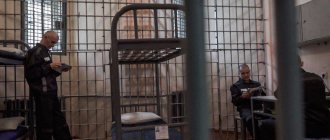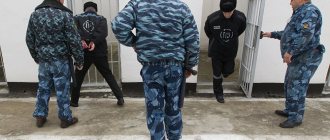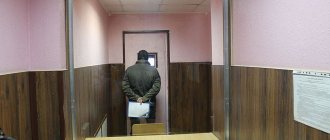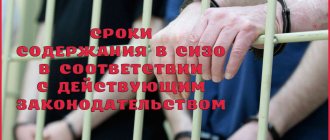According to the Regulations on the pre-trial detention center of the penal system of the Ministry of Justice of the Russian Federation, approved by Order of the Ministry of Justice of the Russian Federation dated January 25, 1999 No. 20, a pre-trial detention center (abbreviated as pre-trial detention center) is an institution controlled by the Ministry of Justice for keeping suspects and accused (also defendants and convicts) in committing crimes for which a preventive measure in the form of detention was chosen. Also, pre-trial detention centers are intended for the execution of punishment in relation to those sentenced to imprisonment, left in the institution for its economic maintenance, as well as those deprived of liberty for a period of not more than 6 months, who have expressed their consent to serve their sentence in a pre-trial detention center.
According to Article 18 of Federal Law No. 103 of July 15, 1995 “On the detention of suspects and accused of committing crimes,” a citizen placed in a pre-trial detention center has the right to see his lawyer starting from the moment of detention. These visits are confidential, with no restrictions on the number or duration of meetings. To get to the Principal, the lawyer only needs to provide a warrant and identification - the heads of the pre-trial detention center do not have the right to demand other documents or in any way interfere with these meetings.
In practice, this legal requirement was constantly violated. Thus, since the days of Soviet legislation, a lawyer, in order to visit his client in a pre-trial detention center, had to submit, in addition to a warrant and identification, a certificate addressed to the head of the pre-trial detention center, signed by the person in charge of the criminal case (investigator, interrogator or judge), which stated that that a specific lawyer is allowed to visit his Client in the detention center. The need to provide such permission in the Russian Federation was regulated by the Internal Rules of Pretrial Detention Facilities. After the adoption of the above-mentioned Federal Law No. 103, the situation did not change fundamentally: a certificate was still required, it’s just that in the text of the certificate, the indication of permission was essentially changed to a notification that a lawyer was allowed to participate in a specific case to protect a specific person.
All this sometimes caused serious obstacles to the lawyer providing prompt legal assistance; in some cases, the investigative authorities, trying to delay the lawyer’s access to the Client, avoided meeting with the lawyer to issue a certificate of admission to the case; the lawyer could not get to the Client for up to two weeks, and something and more that created difficulties for defense.
In this regard, lawyers went to the courts, complained, and addressed various authorities on this issue and the bodies of the legal community: the Federal Chamber of Lawyers, the bar chambers of the constituent entities of the federation. As a result, the issue was raised before the Constitutional Court of the Russian Federation, which, by Resolution No. 14-p of January 25, 2001, declared the possibility of a lawyer entering a pre-trial detention center on the basis of the investigator’s permission unacceptable, and the restriction on a lawyer’s access as unconstitutional. This position of the Constitutional Court was also subsequently confirmed by other decisions (Resolution No. 20-p dated December 26, 2003, Determination dated October 25, 2016 on the complaint of lawyers V. Karaulova and others)
However, the situation moved in a positive direction only after the Plenum of the Supreme Court of Russia adopted Resolution 93pv-02 on October 02, 2002, which stated that the requirement from a lawyer to meet with a client in custody is to provide additional documents in the form of certificates and other permits , other than ID and warrant, is illegal.
After the adoption of this Resolution of the Plenum of the Supreme Court, lawyers actually began to be admitted to the pre-trial detention center solely on the basis of a warrant and identification. True, this situation did not last long; gradually the situation returned to the previous one. At the same time, as a legal basis for this requirement, the norm contained in Art. 49 of the Code of Criminal Procedure of the Russian Federation, according to which a lawyer is “allowed to participate in the case” on the basis of a certificate and a warrant; that is, according to representatives of the pre-trial detention center, in addition to the warrant and identification, it is necessary to recognize the fact that a lawyer is admitted to participate in the case; the investigator (inquirer, judge) allows participation in the case, who notifies about this in the certificate; Without providing this certificate, the administration of the pre-trial detention center knows nothing about the lawyer’s admission to the case, and therefore cannot allow the lawyer to see the client.
At the beginning of 2016, in fact, not a single pre-trial detention center in Moscow (as well as in other subjects of the federation) allowed a lawyer to see a client without a certificate from the investigator (inquiry officer, judge), which was ironically called not a permit, but a notification.
It seemed that the situation was hopeless, and the lawyers had to come to terms with the state of affairs. However, Federal Law No. 73-FZ of April 17, 2017 introduced large-scale changes and additions to the Code of Criminal Procedure of the Russian Federation, among which Part 4 of Art. 49, which established in the new edition that a lawyer enters into a case on the basis of a warrant and identification; the requirement to admit a lawyer has now been eliminated.
Thus, today, pre-trial detention center employees do not have the right to demand from lawyers other documents (certificates, notifications, permits, etc.) in addition to identification and warrants.
Why are visits to pre-trial detention centers carried out by a lawyer?
A visit to a pre-trial detention center by a lawyer serves several purposes:
- provision of legal assistance in a criminal case: development of a defense position, preparation for investigative actions or court hearings, participation in investigative actions in a pre-trial detention center, drawing up complaints, petitions and other procedural documents, familiarization with the materials of a criminal case, etc. provision of legal assistance on issues not related to the accusation (suspicion): alienation of property, issues of care for children and other disabled family members, business issues, labor relations, medical care, etc.
- providing psychological support to the Principal, ensuring communication with close relatives and friends;
verification of compliance with the legislation on the detention of suspects, accused and convicted persons in pre-trial detention centers, prevention, identification and suppression of violations of the rights of the Principal by pre-trial detention center employees
As practice shows, it is easier and simpler for citizens held in a pre-trial detention center to stay in this penitentiary institution if they are periodically visited by a lawyer. It is the lawyer who suppresses the illegal actions of the pre-trial detention center administration, does not allow confessions to be “knocked out”, and also strictly monitors the conditions of detention of his Client. This is especially important if the citizen has any health problems.
Queues, denials and threats: how lawyers work in a pre-trial detention center
It's hard to get to trustees
On Sunday, January 17, politician Alexei Navalny returned to Russia. Since that day, several of his supporters have been detained. During these days, the lawyers had a hard time. Under a variety of pretexts, they were not allowed into the police stations where the detainees were kept.
On January 21, lawyer Mansur Gilmanov came to the Moscow police department to see his client, Anti-Corruption Foundation lawyer Vladlen Los. There the defense lawyer was beaten by a policeman, then the lawyer was arrested for five days.
On January 23, Krasnodar lawyer Mikhail Benyash was arrested: the police and the court did not like the fact that he called on social networks to provide legal assistance to those detained at protest rallies.
Against the backdrop of protests in recent days, the Advokatskaya Ulitsa publication drew attention to another trend: sometimes lawyers were no longer allowed not only to the police department, but also to the courts. Moscow AP lawyer Mikhail Salkin was unable to get to his client in the Zyuzinsky District Court of Moscow. Another colleague of his, Maxim Pashkov, faced a similar problem in the Tagansky District Court of Moscow. While the bailiffs did not allow the defender to enter the checkpoint, his client was convicted. Some St. Petersburg lawyers found themselves in a similar situation.
Human rights activists and the legal profession have already responded to this problem: the Human Rights Council plans to appeal to the Ministry of Internal Affairs due to the massive refusal of lawyers to enter the police department, where those detained at protests were taken. And the Moscow AP announced “Research on the denial of access to principals to departments of the Ministry of Internal Affairs.” The FPA also contacted the Ministry of Internal Affairs: they complained to Minister Vladimir Kolokoltsev about numerous violations of the rights of lawyers and called on the department to dialogue.
In a word, denial of access to clients is a workday routine. The problem is especially acute in pre-trial detention centers. In its research for the report of the Institute of Law and Public Policy, the Federal Chamber of Lawyers cited the results of a survey of 726 lawyers conducted from August 8 to October 1, 2022. More than 30% of respondents then said that they had encountered groundless denial of admission to a pre-trial detention center. This problem, according to the lawyers interviewed, is especially common in detention centers in Moscow, St. Petersburg, Arkhangelsk, Chelyabinsk, Krasnodar, Tyumen, Tver, Volgograd, Rostov-on-Don, and Bugulma. “The pre-trial detention center staff may not allow lawyers to see their clients, and in the most brutal form this happens in the Lefortovo pre-trial detention center,” Vadim Klyuvgant, deputy chairman of the FPA commission for protecting the rights of lawyers, told Pravo.ru.
Lawyers are not allowed into pre-trial detention centers for both apparently “legitimate” and outright illegal reasons.
Routine difficulties
A visit to a client in a pre-trial detention center takes a whole working day, says the head of the law firm, Evgeniy Tonkov: “You wait outside for 2-3 hours, you wait inside for 2-3 hours, you communicate with the client for 1-2 hours – this does not include the journey there and back.” It is not always possible to register online; there are simply not enough places (for example, according to lawyer Maria Eismont, during the period of coronavirus restrictions such a problem occurred in the capital’s pre-trial detention center No. 2 “Butyrka”). For the same reason, a live queue often does not help.
There are cases when lawyers fight their way into the detention center (in the literal sense of the word). This problem is especially acute in Moscow, where defenders compete for a place in line in a lottery (Lefortovo pre-trial detention center) and line up at 4-5 in the morning, which, by the way, does not guarantee entry into the detention center.
Artem Chekotkov, lawyer MCA Knyazev and partners Knyazev and partners Federal rating. group Criminal law Company profile
There are several reasons. First of all, there are not enough investigative rooms. Them, according to the partner of Romanov & Partners Law Firm Romanov & Partners Law Firm Federal rating. group Criminal law Company profile of Matvey Protasov, there are always fewer people than willing. In some detention centers it’s even worse: the visiting rooms are divided into “investigation rooms”, where you can’t see each other without an investigator, and “rooms for visiting with a lawyer,” says Viktor Ushakevich, partner at AB Law Bureau “Q&A” Law Bureau “Q&A” Regional rating. group Family and inheritance law group Criminal law group Arbitration proceedings (major disputes - high market) Profile, he adds.
You can go on dates only during limited hours - from 10 to 15 or 17 hours, with a break for lunch. And on weekends, the pre-trial detention centers are closed to visitors. This, according to Eismont, is a fairly significant problem: “A big help for lawyers would be the opening of detention centers on weekends - for those who are ready to work on these days.”
The work of lawyers is complicated by the ban on equipment (Article 18 of the law on detention): it cannot be used during a meeting with a client and cannot be brought into detention centers at all (in colonies, the Supreme Court noted a similar ban in 2017 - case No. AKPI17-867). As a result, the lawyer has to decide in advance what documents he may need at the meeting with the client and print them out, says Ushakevich. But this is inconvenient, because not everything can be foreseen in advance.
According to Tonkov, lawyers with large briefcases constantly forget to take out flash drives, cables, chargers, headphones, iPads, spare phones, and so on from their numerous pockets. Violating the order, even unintentionally, can result in serious sanctions.
If a lawyer remembers before the inspection that he forgot to hand over the flash drive at the first “milestone”, he is subject to administrative or disciplinary proceedings with possible deprivation of his lawyer status. Prison staff treat active defenders with increased attention and are happy about any mistake they make.
Evgeniy Tonkov, head of the law firm
It is prohibited to exchange any documents or things with clients, except through the pre-trial detention center staff. According to the partner of the Law Office ZKS Law Office ZKS Federal rating. Criminal Law group 16th place by revenue per lawyer (less than 30 lawyers) 41st place by revenue Company profile of Andrey Grivtsov, this procedure complicates the process of agreeing on a position on the case. Having submitted documents to the office of the detention center, you cannot be 100% sure that the client will not receive them in a week or a month, notes Tonkov. “He may not receive them at all, because they will be sent to the investigator or in an unknown direction,” the expert shares.
The ban on direct exchange is often violated. No one has lifted the sanctions for this, but they are acting selectively. FSIN employees turn a blind eye to the exchange of documents and things between investigators and those arrested, but they can initiate administrative proceedings against lawyers, says the lawyer.
Abuses by pre-trial detention center employees
There are also abuses by pre-trial detention center employees. Mainly, according to Chekotkov, with the aim of persuading the accused to admit guilt or testify against other persons. To achieve this, various forms of pressure are used in detention centers: “attacks” from cellmates, meetings of prisoners with operatives “without protocol” and, accordingly, without a lawyer, various incentives and punishments (transfer to “bad” or “good” cells), says Protasov .
Pre-trial detention center employees can confiscate valuables from the accused, and the investigator can deny him access to his family, Chekotkov adds. As a result, the lawyer has to provide not only legal, but also psychological assistance. In addition, such pressure may not have the best effect on the outcome of the case.
Seven cases where the Supreme Court protected the rights of prisoners
According to Chekotkov, the investigation and the Federal Penitentiary Service persistently ignore the provisions of the law that a defense attorney does not need to obtain the investigator’s permission to meet with a client. As a rule, such permission in detention centers is required from those lawyers who come to the client for the first time to conclude an agreement. For example, Magomet Aushev, lawyer of the Rostov Region Administration, found himself in a similar situation last August. He wanted to meet with Bagaudin Evloev to obtain his consent to participate as a defense attorney in a criminal case. But the employees of the Vladikavkaz pre-trial detention center-6, where Evloev was kept, refused to let a lawyer in without the permission of the investigator.
The Federal Chamber of Lawyers also drew attention to this problem in its “correspondence” with the Federal Penitentiary Service, emphasizing that for the first meeting the defense lawyer only needs to present an identification card and a warrant. However, the FSIN itself did not see anything reprehensible in such practice, citing uncertainty in the legislation in its response to the FPA.
And some Moscow pre-trial detention centers require lawyers to present a new warrant at each visit (this practice, in particular, took place in pre-trial detention center-3 “Presnya” and pre-trial detention center-4 “Medved”). The FSIN itself recognized this requirement as illegal, promising to carry out explanatory work in regional departments.
But that's not all. The office where the meeting with the client is taking place can be bugged, especially if the client is accused of an economic or official crime, terrorism, extremism, and also if this is a high-profile case for other reasons, Ushakevich notes.
It is unlikely, of course, that the recording of your conversation will directly end up in the case file, but all the necessary information is taken into account, as both I and my colleagues have been convinced of many times. Once I even tried deliberate misinformation, knowing that our conversations were listened to with special attention.
Matvey Protasov, partner at Romanov & Partners Law Firm Romanov & Partners Law Firm Federal rating. group Criminal law Company profile
The pandemic has only exacerbated privacy concerns. According to Chekotkov, in some detention centers it was necessary to communicate with the client not in the investigative rooms, but in the visiting rooms in the presence of other lawyers and defendants. Communication took place through glass, by telephone. Previously, Tonkov expressed concerns that such negotiations could be recorded and then made available to operational officers and investigators.
How to deal with this?
In “correspondence” with the Federal Chamber of Lawyers, the FSIN stated that the problem with queues in the pre-trial detention center is beyond its competence. The department explained the long wait by the overcrowding of isolation centers and the fact that many of them were built even before the introduction of standards for the number of visiting rooms (45 or 50 per 1000 people). It is now impossible to increase the number of meeting rooms “due to the design features of the buildings,” the FSIN explained.
In turn, the service explained the allocation of offices to investigators on a priority basis by the requirements of Art. 28 of the law on detention, which obliges the administration to provide the investigator with premises for investigative actions.
“The administration of the pre-trial detention center has no right to interfere with investigative actions or hinder them. This circumstance, among other things, prevents the electronic registration of lawyers for meetings, as well as the provision of an office for a lawyer to work with a suspect and accused on a priority basis,” says the department’s response (“Lawyer Street”).
However, there is an example where an administrative lawsuit and public attention most likely helped to reduce queues in a pre-trial detention center. On April 27, 2020, Tonkov filed a lawsuit against the St. Petersburg pre-trial detention center-1 “Kresty”. He complained about constant denials of access to his client, which, in particular, were explained by sanitary days on Fridays and the lack of offices for lawyers due to the priority queue for investigators. On April 29, Kommersant wrote about the lawsuit. On the same day, the pre-trial detention center moved the sanitary day to Saturday and promised to open first 11 and then 12 more rooms for meetings with lawyers in the coming days. Subsequently, Tonkov withdrew his claim due to threats that his client began to receive.
The Supreme Court assessed the case where a lawyer was prevented from working in a pre-trial detention center
If we talk about abuses, then the ways to combat them depend on the nature of the violation. “If, for example, a lawyer presented an order for protection and identification, and he is unreasonably denied a meeting with the client, this is an obvious abuse, and yes, of course, it is possible and necessary to appeal,” comments Ushakevich.
Tonkov gives a successful example of judicial appeal. In December 2018, the Moscow District Court of St. Petersburg declared illegal the refusal of St. Petersburg pre-trial detention center-1 to issue lawyer Maria Strelnik a pass to visit her client. The prisoner explained his actions by the fact that his lawyer is now working with another defendant in the same case. If we organize a meeting between Strelnik and her client, the two defendants may collide, but they are prohibited from communicating, the pre-trial detention center decided. But two courts were not satisfied with this justification (No. 33a-9433/2019).
Moscow City Court: denial of admission to a pre-trial detention center does not violate the rights of a lawyer
However, practice knows many cases of refusal of such claims (for example, the decision of the Moscow City Court in case No. 33a-2390/2018). You can wait more than one month for a decision on the case. During this time, a lot can change, for example, a person will be transferred to another pre-trial detention center. Therefore, it is more effective, of course, to try to solve the problem of non-admission on the spot. Moreover, according to Ushakevich, they often arise due to the incompetence of ordinary pre-trial detention center employees. “Let’s say the guard asked the lawyer for the investigator’s permission to meet with the client, whereas according to the law, only a lawyer’s warrant and identification are needed. A problem of this kind, as a rule, can be solved if you visit the head of the pre-trial detention center or his deputy, or even just the duty station,” shares Ushakevich.
If a lawyer suspects that the office is being bugged, then without some significant evidence the complaint is unlikely to be effective, Ushakevich warns. In such cases, you can resort to a “written conversation,” the lawyer advises.
In turn, the problem of pressure on the client and its possible consequences for the case will be best solved by psychological preparation of the client, Protasov is sure: “Those who are persistent and well-informed do not succumb to pressure at the pre-trial detention center level.” But if such pressure threatens the life and health of the defendant, then an administrative claim can be an effective solution. Moreover, it is not at all necessary that the court satisfy it.
Administrative judges are forced to call representatives of the pre-trial detention center and the department of the Federal Penitentiary Service for the subject, request documents, and interrogate the declared witnesses, including detention center employees. The processes themselves, which last for months, sober up the administration, remind them of the possibility of dismissal and force them to respect people’s rights.
Evgeniy Tonkov, head of the law firm
The lawyer said that once his client, who had not previously been prosecuted, was placed with a person convicted of murder, although the law directly prohibits keeping such persons in the same cell. “An experienced prisoner, probably “working off his parole,” at the will of the investigator and the detective, persuaded his cellmate to admit guilt, tortured him with cold: on frosty winter nights he opened the window to the street and forbade him to close it,” says Tonkov. According to the lawyer, this situation was resolved after appeals to the head of the pre-trial detention center, a series of complaints and an administrative lawsuit. As a result, the defendant was transferred first to the medical unit (he caught a cold due to the open window), and then to another cell with a calmer cellmate, says Tonkov. According to him, the claim later had to be abandoned because the principal was threatened. But they still managed to achieve their goal, the lawyer summarizes.
- Kira Klimacheva
- Lawyers
- Law enforcement
If you need a lawyer to visit you in a pre-trial detention center
A citizen placed in a pre-trial detention center should not waive his right to be visited by a lawyer. A competent lawyer will do everything to ensure that the rights of his Client are respected by all participants in the criminal process. In addition, personal meetings are necessary for the lawyer to build a more effective line of defense, taking into account the position of the Principal and the circumstances of the case, and, therefore, will speed up the process of release.
A lawyer’s visit to the pre-trial detention center to meet with his client is another service I provide. I am ready to provide my assistance in any pre-trial detention center in Moscow to the extent necessary for the Principal. The service can be provided one-time, or as part of a comprehensive defense in a criminal case.
How can one get into a pre-trial detention center?
To do this, he must present a lawyer's license and a warrant. has no right to demand other documents from the defense lawyer . The conditions and number of visits by a lawyer to a person under investigation in a detention center are prescribed in an agreement with relatives .
Is a lawyer searched when visiting a pre-trial detention center?
Definitely , like any person entering a restricted area. Personal belongings are checked with a metal detector to detect items prohibited from free circulation. And these include not only drugs, but also mobile devices - phones and other gadgets.
In what cases are lawyers not allowed?
legally not let you in only if the lawyer does not have the appropriate documents - identification and warrant .
However, usually officials of the penitentiary system calm down if they see that the lawyer is not going to tolerate their arbitrariness . Therefore, to the question “did the investigator see you,” a competent lawyer answers “no and don’t ask.”
Another thing is that this will greatly delay the matter, because time is also precious. Therefore, in some pre-trial detention centers, a lawyer, willy-nilly, has to ignore the illegality of the demands and go to the investigator for permission. By the way, the latter is not always the opponent and main antagonist of the servant of justice - on the contrary, he can provide the lawyer with valuable information on a particular defendant.
It may seem that the lawyer will turn the pre-trial detention center for his client into some kind of sanatorium . This is far from true. There will be plenty of difficulties, but the participation of a defender may negate the most important of them - unfair punishment .
Who are allowed
Visits in pre-trial detention centers are allowed without restrictions for the following persons:
- Family members and other close people, but not related by blood.
- Notaries, if they need to draw up any documents.
- Lawyers responsible for handling cases.
Reference! The main regulatory act in this case is No. 103-FZ.
It’s worth taking a closer look at article 18. Any refusal based solely on lack of relationship can be easily appealed to a higher authority. There are no prohibitions on meeting with minors. Children and adolescents under 18 years of age cannot visit detention centers alone. You can also study Order of the Ministry of Justice No. 189 of 2005. It is dedicated to the internal regulations for such institutions.
It is also useful to read: A day and a half or two in a pre-trial detention center
Violation of the constitution and human rights
Article 55 of the constitution, which has not yet been amended, states that “the rights and freedoms of man and citizen may be limited by federal law only to the extent necessary in order to protect the foundations of the constitutional system, morality, health, rights and legitimate interests of other persons, ensuring the country's defense and state security." Restrictions on visits with a lawyer were introduced based on a decision by the leadership of the Federal Penitentiary Service, which is not a federal law. Therefore, such restrictions, of course, do not comply with the constitution.
Article 6 of the European Convention on Human Rights regulates the right to a fair trial, including the right to legal assistance. Based on Article 15 of the Convention, the rights enshrined in Article 6 can be limited in an emergency. But for this it is necessary to duly notify the Secretary General of the Council of Europe. The notice is called a “derogation.” Russia has not yet officially notified its derogation from compliance with its obligations in emergency situations.
Some states are already applicants for derogation. For example, Georgia announced restrictions on visits to prisoners. Taking into account the fact that Georgia has not derogated from Article 6, it follows that family visits are limited. Estonia also announced derogation and a ban on visits to places of detention. Estonia has derogated from Article 6, so we can conclude that meetings with a lawyer are also subject to restrictions.
Russia has not announced derogation from the convention. Thus, the provisions of the convention continue to require the admission of defense counsel. Having the opportunity for derogation, the Russian authorities prefer not to take steps to move restrictions into the white, legal zone.
How does a meeting during an investigation take place and how long does it last?
Generally, appointments are on a first-come, first-served basis. Sometimes you have to wait 3 hours or more.
Accused persons and prisoners may not be allowed access if one of the following conditions is met:
- Lack of information about the citizen in the visit permit.
- Lack of identification documents on hand.
- When intoxicated by alcohol or drugs.
Institution staff take meeting participants to special rooms designed for such events. Then they themselves continue to monitor what is happening. It is mandatory to have special glass partitions - they will protect against the transfer of prohibited items.
Attention! It is permissible to listen to conversations taking place at this time.
Early termination of a meeting is also permitted if at least one of the following circumstances is present:
- The institution's property is deteriorating.
- The suspect is given information that may disrupt the course of the criminal case or contribute to concealing the truth.
- An attempt to transfer products and other substances that are prohibited.
Everything that is brought into meetings with suspects and prisoners is subject to thorough checks. Even cigarettes are broken in half to make sure there are no foreign objects inside. Any packaging, paper or plastic, is opened. It is better not to bring some products from home, but to buy them on the territory of the pre-trial detention center, for which special stalls are opened.
For one date, the maximum duration is set at three hours. In this case, there are no longer events.
Foreign experience
In France, after declaring a state of emergency, the President issued Decree No. 2020-303 of March 25, 2022, which introduced restrictions on visits with a lawyer. Article 13 states that meetings with a lawyer may take place via electronic means of communication, including telephone, provided that these means of communication guarantee confidentiality. On March 23, French prisoners received €40 a month for calls to loved ones - this can be enough for 11 hours of calls on a landline or 5 hours on a mobile phone.
Naturally, the restrictions caused concern among the French public, but the Minister of Justice assured that the restrictions were introduced for the duration of the state of emergency and “there is no question that these provisions will become the norm.”
In addition, France has begun to release prisoners who do not pose a danger from pre-trial detention centers and prisons. Three days ago, 3,500 people who had already completed serving their sentences were released.
British Secretary of State of March 26, 2022 limits the rights of citizens due to the coronavirus pandemic. However, lawyers' access to their clients is not limited. The National Police Chiefs Council has issued guidance on precautions during coronavirus. The guidance states that police officers may conduct health screening and questioning of visitors. The guidance also calls for minimizing risk, especially for prisoners over 70 or with health problems.
Separately, the manual dwells on the right to legal assistance, pointing out that “the implementation of the right to legal assistance is very important. “Police” officers must help representatives (i.e., lawyers - Forbes’ note) effectively organize the process. Where possible, preference should be given to receiving assistance by telephone.” The Scottish police specifically emphasize the need to ensure confidentiality of telephone communications.
The UK Government website states that “urgent work is being carried out to improve contact between prisoners and their lawyers. This includes increasing video conferencing capabilities in prisons.”
Advertising on Forbes
Meanwhile, in Russia , the initiative to release people from pre-trial detention centers and colonies has quarreled even with the Presidential Human Rights Council, that is, a body whose sole function is precisely the protection of civil rights. However, despite internal disputes, on April 1, the HRC nevertheless appealed to the Federal Penitentiary Service of Russia, the Investigative Committee and the Council of Judges with a request to pay close attention to the situation with the detention of citizens in pre-trial detention centers and to consider the possibility of changing the preventive measure for some of those arrested and releasing them from custody and placement under house arrest.”










